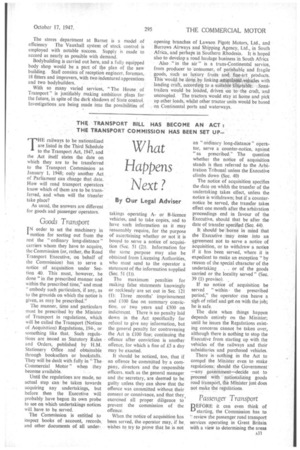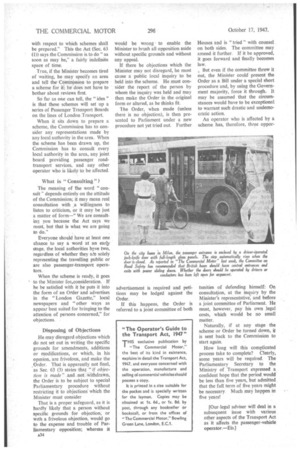THE TRANSPORT BILL HAS BECOME AN ACT: THE TRANSPORT COMMISSION HAS BEEN SET UP—
Page 43

Page 44

If you've noticed an error in this article please click here to report it so we can fix it.
What Happens
Next ?
By Our Legal Adviser THE railways to be nationalized are listed in the Third Schedule to the Transport Act, 1947, and the Act itself states the date on which they are to be transferred to the Transport Commission as January 1, 1948; only another Act , of Parliament can change that date. How will road transport operators know which of them are to be transferred, and when will the transfer take place?
As usual, the answers are different for goods and passenger operators.
Goods Transport
IN order to set the machinery in motion for sorting out from the rest the "ordinary long-distance" carriers whom they have to acquire, the Commission (or, rather, the Road Transport Executive, on behalf of the Commission) has to serve a notice of acquisition under Section 40. This must, however, be done "in the prescribed manner and within the prescribed time," and must " embody such particulars', if any, as to the grounds on which the notice is given, as may be prescribed."
The manner, time and particulars must be prescribed by the Minister of Transport in regulations, which will be called the Transport (Notices of Acquisition) Regulations, 194-, or something like that. Such regulations are issued as Statutory Rules and Orders, published by H.M. Stationery Office and obtainable through booksellers or bookstalls. They will be dealt with fully in "The Commercial Motor" when they become available. ,
Until the regulations are made, no actual step can be taken towards acquiring any undertakings, but before then the Executive will probably have begun its own probe to see on which undertakings notices will have to be served.
The Commission is entitled to inspect books of account, records, and other documents of all under takings operating Aor B-licence vehicles, and to take copies, and to have such information as it may reasonably require, for the purpose of ascertaining whether or not it is bound to serve a notice of acquisition (Sec. 51 (2)). Information for the same purpose may also be obtained from Licensing Authorities, who must send to the operator a statement of the information supplied (Sec. 51 (1)).
The maximum penalties for making false statements knowingly or recklesslyare set out in Sec. 121 (I): Three months' imprisonment and £100 tine on summary conviction, or two years and £500 on indictment. There is no penalty laid down in the Act specifically for refusal to give any information, but the general penalty for contravening the Act is £100 fine; continuing the offence after conviction is another offence, for which ‘a fine of £5 a day may be exacted.
It should be noticed, too, that if an offence be committed by a company, directors and the responsible officers, such, as the general manager and the' secretary, are deemed to be guilty unless they can show that the offence was committed without their consent or connivance, and that they exercised all proper diligence to prevent the commission of the offence.
When the notice of acquisition has been served, the operator may, if he, wishes to try to prove that he is not an "ordinary long-distance" operator, serve a counter-notice, against "as prescribed." The question whether the notice of acquisition stands is then referred to the Arbitration Tribunal unless the Executive climbs down (See. 40) The notice of acquisition specifies the date on whrch the transfer of the undertaking takes effect, unless the notice is withdrawn; but if a counternotice be served, the transfer takes effect one month after the arbitration proceedings end in favour of the Executive, should that be after the date of transfer specified (Sec. 44)
It 'should be borne in mind that the Executive 'may enter into an agreement not to serve a notice of acquisition, or to withdraw a notice if it has been served, where it is 'expedient to make an exception "by reason of the special character of the
undertaking . . or of the goods carried or the locality served" (Sec. 39 (1) proviso).
If no notice of acquisition be served "within the prescribed period," the operator can heave a sigh of relief, and-get on with the job; he is safe.
The date when things happen depends entirely an the Minister; until he issues the Regulations existing concerns cannot be taken over, although there is nothing to stop the Executive from starting up with the vehicles of the railways and their subsidiaries and purchased vehicles.
There is •nothing in the Act to compel the Minister even to make regulations; should the Government —any government—decide not to proceed with nationalizing goads road transport, th'e Minister just does not make the regulations.
Passenger Transport . .
nEFORE it can even think of starting, the Commission has to " review the passenger road transport services operating in Great Britain with a view to determining the areas
with respect to which schemes shall be prepared." This the Act (Sec. 63 (I)) says the Commission is to do "as soon as may be," a fairly indefinite space of time.
True, if the Minister becomes tired of waiting, he may specify an area and tell the Comtnission to prepare a scheme for it; he does not have to bother about reviews first.
So far as one can tell. the " idea " is that these schemes will set up a series of Passenger Transport Boards on the lines of London Transport.
When it sits down to prepare a scheme, the Commission has to consider any representations made by any local authority in the area. When the scheme has been drawn up, the Commission has to consult every local authority in the area, any joint board providing passenger roadtransport services, and any other operator who is likely to be affected.
What is " Consulting " ?
The meaning of the word " consult " depends entirely on the attitude of the Commission; it may mean real consultation with .a willingness to listen to criticism, or it may be just a matter of form—" We are consulting you because the Act says we must, but that is what we are going to do."
Everyone should have at least one chance to say a word at an early stage, the local authorities Five two, regardless of whether they ate solely representing the travelling public or are also passenger-transport operators.
When the scheme is ready, it goes to the Minister for...consideration. If he be satisfied with it he puts it into the form of an Order and advertises in the "London Gazette," local newspapers and "other ways as appear best suited for bringing to the attention of persons concerned," for objections.
Disposing of Objections He may disregard objections which do not set out in writing the specific grounds for amendments, additions or modifications, or which, in his opinion, are frivolous, and make the ,Order. That is apparently not final, as Sec. 63 (3) states that "if objection is made" and not withdrawn, the Order is to be subject to special Parliamentary procedure without restricting it to objections which the Minister must consider
That is a proper safeguard, as it is hardly likely that a person without specific grounds •for objection, or with a frivolous objection, would go to the expense and trouble of Parliamentary opposition; whereas it
would be wrong • to enable the Minister to brush all opposition aside without specific grounds and without any appeal.
If there be objections which the Minister may not disregard, he must cause a public local inquiry to be held into the scheme. He must consider the report of the person by whom the inquiry was held and may then make the Order in the original form or altered, as he thinks fit.
'the Order, when made (unless there is no objection), is then presented to Parliament under a new procedure not yet tried out. Further advertisement is required and petitions may be lodged against the Order.
If this happens, the Order is referred to a joint committee of both Houses and is " tried " with counsel on both sides. The committee may amend it further. If it be approved, it goes forward and finally becomes law.
„ lain even if the committee threw it out, the Minister could present the Order as a Bill under a special short procedure and, by using the Government majority, force it through. It may be assumed that the circumstances would have to be exceptional to warrant such drastic and undemocratic action.
An operator who is affected by a scheme has, therefore, three oppor
tunities of defending himself: On consultation, at the inquiry by the Minister's representative; and before a joint committee of Parliament. He must, however, pay his own legal costs, which would be no small matter.
Naturally, if at any stage the scheme or Order be turned down, it is sent back to the Commission to start again.
How long will this complicated process take to complete? Clearly, some years will be required. The Parliamentary Secretary to the Ministry of Transport expressed a confident hope that the period would be less than five years, but admitted that the full term of five years might be necessary. Much may happen in five years!
[Our 'legal adviser will deal in a subsequent issue with various other aspects of the Transport Act as it affects the passenger-vehicle operator.—EDI












































































